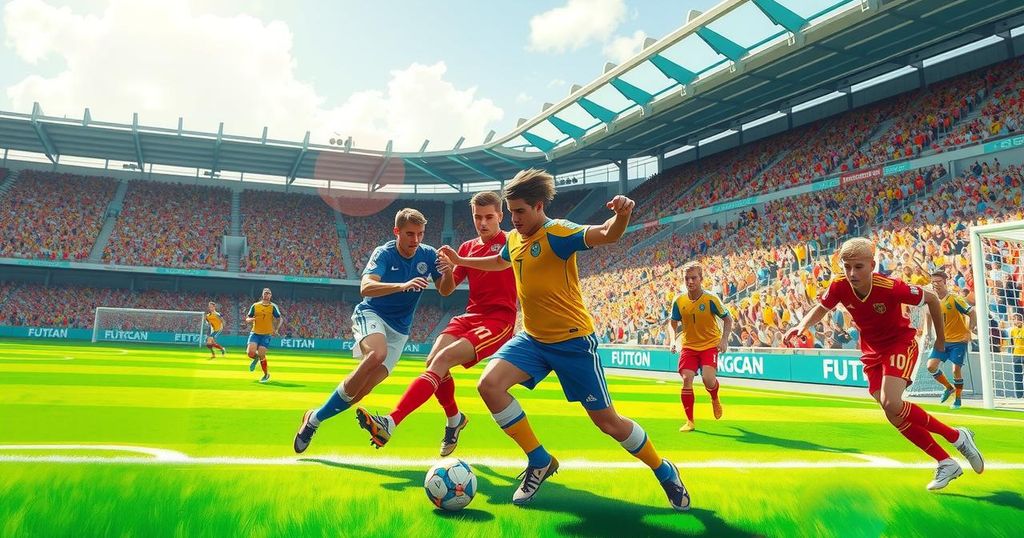South Africa triumphed over Argentina 48-7 to win the Rugby Championship, with notable performances from Aphelele Fassi and Pieter-Steph du Toit scoring two tries each. The Springboks dominated the match, leading 27-7 at halftime and securing victory with a total of seven tries. South Africa crowned their championship run with 24 points, contrasting against Argentina’s 14.
In an emphatic display of rugby prowess, South Africa secured the title of Rugby Championship champions by defeating Argentina with a decisive score of 48-7 at Mbombela Stadium on Saturday. The South African side showcased their dominance with seven tries, contributing to a scoreline that highlighted their superior performance throughout the match. Two tries each were scored by full-back Aphelele Fassi and flanker Pieter-Steph du Toit, while additional tries came from wing Cheslin Kolbe, hooker Malcom Marx, and centre Jesse Kriel. South Africa went into halftime with a commanding lead of 27-7, as Argentina struggled with disciplinary issues that culminated in a red card for flanker Pablo Matera and yellow cards for brothers Mateo and Santiago Carreras. Jaden Hendrikse, who was unexpectedly appointed as the goal-kicker, successfully converted two tries and added a penalty, while substitute playmaker Handre Pollard converted three additional tries. Argentina’s only scoring came from fly-half Tomas Albornoz, who successfully converted his own try. The Springboks concluded the Southern Hemisphere championship with a total of 24 points, outpacing the previous titleholders, New Zealand, who finished with 16 points. Argentina ended the tournament with 14 points, while Australia trailed with just five points. Notably, the match also marked a significant milestone for Springbok lock Eben Etzebeth, who became the most-capped Springbok with 128 Test appearances, surpassing the record previously held by Victor Matfield. Despite earlier criticisms regarding his performance in a previous match against Argentina, in which South Africa narrowly lost 29-28, South African coach Rassie Erasmus demonstrated his trust in fly-half Manie Libbok, elevating him to a starting position for this match. However, goal-kicking responsibilities were reassigned to Hendrikse, who proved effective in this crucial role. From the outset, South Africa dominated play, initially scoring just eight minutes in with a try from Fassi. As Argentina struggled to maintain possession and fell further behind, South Africa capitalized on their mistakes, eventually securing victory with multiple tries in the second half as Argentina faced further setbacks with their players being sin-binned. The Springboks will now take a brief hiatus before resuming play in November against European teams, including Scotland, England, and Wales.
The Rugby Championship is an annual rugby union competition involving the southern hemisphere’s premier national teams, namely South Africa, New Zealand, Argentina, and Australia. It typically features a series of matches played over several months, culminating in a final standing that determines the champion. South Africa’s victory in this year’s championship not only underscores their exceptional skills and teamwork but also marks a return to form, as their previous title in this competition dated back five years. Furthermore, the match highlighted critical issues of discipline as seen through Argentina’s numerous penalties and cards, ultimately affecting their performance throughout the tournament. Player milestones, such as those achieved by Eben Etzebeth, also reflect the sport’s rich history and competitive spirit.
The match exemplified South Africa’s rugby dominance, characterized by strategic play, disciplined execution, and resilient teamwork. With a 48-7 victory over Argentina, the Springboks secured the Rugby Championship title convincingly, showcasing their ability to capitalize on opponents’ mistakes and maintain superior control of the game. As they prepare for upcoming international tests in Europe, South Africa’s latest triumph reaffirms their status as formidable contenders on the world rugby stage.
Original Source: www.barrons.com



